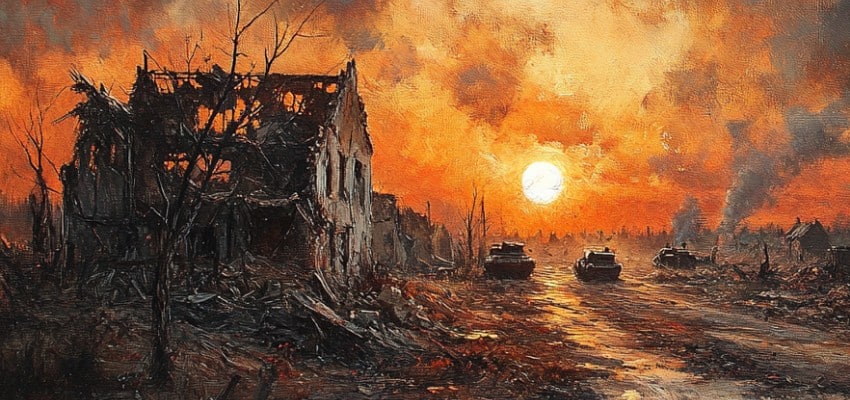Editor’s Note: This assessment analyzes key military and geopolitical developments as of September 14, 2024, surrounding Russia’s offensive campaign in Ukraine, specifically focusing on the ongoing operations in Kursk Oblast, prisoner exchanges, command decisions affecting troop quality, and broader Russian efforts to leverage global influence mechanisms. It also examines relevant details of Ukrainian incursions, the evolving frontline situation, and strategic responses by both Ukraine and Russia. The information is derived from the Institute for the Study of War’s latest assessment and offers a factual, in-depth perspective on the evolving situation on the ground. Readers are encouraged to review this analysis in the context of the broader conflict dynamics to understand the shifting strategies and their potential impact on the future course of the war.
For those seeking to grasp the full scope of this evolving landscape, the complete updates from the Institute for the Study of War serve as an invaluable resource.
Content Assessment: Ukrainian Incursion into Kursk Oblast Forces Russian Troop Buildup
Information - 91%
Insight - 90%
Relevance - 91%
Objectivity - 92%
Authority - 94%
92%
Excellent
A short percentage-based assessment of the qualitative benefit expressed as a percentage of positive reception of the recent article from ComplexDiscovery OÜ titled, "Ukrainian Incursion into Kursk Oblast Forces Russian Troop Buildup."
Background Note: ComplexDiscovery’s staff offers distinctive perspectives on the Russo-Ukrainian war and Iran-Israel conflict, informed by military experience on the West German, East German, and Czechoslovakian border during the Cold War and in Sinai as part of Camp David Accord compliance activities. This firsthand regional knowledge has been further enhanced by recent staff travels to Eastern European countries, including Estonia, Latvia, Lithuania, and Poland. These visits have provided up-to-date, on-the-ground insights into the current geopolitical climate in regions directly impacted by the ongoing conflict.
Combined with cybersecurity, information governance, and eDiscovery proficiency, this multifaceted experience enables comprehensive analysis of these conflicts, including the critical impact of cyber warfare, disinformation, and digital forensics on modern military engagements. This unique background positions ComplexDiscovery to provide valuable insights for conflict-related investigations and litigation, where understanding the interplay of technology, data, and geopolitical factors is crucial.
Russo-Ukrainian Conflict Update*
Ukrainian Incursion into Kursk Oblast Forces Russian Troop Buildup
ComplexDiscovery Staff
Ukrainian forces’ ongoing incursion into Kursk Oblast has prompted a notable reaction from Russian military leadership. According to reports from Ukrainian officials, the initial presence of 11,000 Russian troops in Kursk Oblast has surged by a factor of three, with estimates now ranging between 30,000 and 45,000 personnel. This redeployment, largely composed of various Russian military and paramilitary units, reflects an operational necessity to counter Ukrainian advances, which began in early August 2024.
The expansion of Russian forces in the region aims to contain Ukrainian offensives targeting Glushkovsky, Korenevsky, and other critical areas within Kursk Oblast. Ukrainian military observer Kostyantyn Mashovets suggested that Russia’s Northern Grouping of Forces in the region now includes around 35,500 personnel distributed across 61 distinct units. Meanwhile, Ukrainian President Volodymyr Zelensky noted that Russia intends to raise this number to 60,000 or even 70,000 troops.
This redeployment is largely seen as a strain on Russia’s broader strategic posture, as forces are being diverted from active frontlines in Ukraine. The challenge of holding Kursk Oblast may force Russia to stretch its resources, including committing additional manpower and equipment that could otherwise bolster defensive lines in Ukraine’s eastern and southern sectors. Analysts indicate that Russia’s potential counteroffensive in Kursk will require even more personnel and resources, complicating its operational flexibility.
POW Exchanges Reflect Shifting Power Dynamics
The Kursk incursion has also spurred increased activity in the exchange of prisoners of war (POWs) between Russia and Ukraine. On September 14, Ukraine and Russia conducted their third POW exchange since the start of Ukrainian operations in Kursk, with each side returning 103 prisoners. Notably, many of the Ukrainian soldiers repatriated had defended the Azovstal Steel Plant in Mariupol during its siege in 2022, while Russia’s returned prisoners were reportedly conscripts captured during recent fighting.
These exchanges highlight a shift in Russia’s negotiation stance, with Ukraine seemingly holding greater leverage due to its advances in Kursk. Ukraine has leveraged this positional advantage to extract more favorable terms in the exchanges, increasing the frequency of POW swaps between the two nations. Since the start of the Kursk incursion in August, Russia and Ukraine have conducted three exchanges, each involving the return of 267 prisoners. For comparison, in the first seven months of 2024, the two nations only conducted three exchanges, covering approximately 405 Ukrainian and 423 Russian prisoners.
This newfound frequency indicates a recognition from Russia that its strategic situation may require short-term concessions, such as POW exchanges, as it grapples with more pressing military and territorial concerns.
Russian Command Decisions Erode Force Quality
On the battlefield, reports of poor command decisions continue to undermine the effectiveness of Russian forces. Russian military commanders have been observed prioritizing infantry-led frontal assaults, often involving personnel with specialized technical skills, over more tactically sound operations. For example, two drone operators from the 87th Motorized Rifle Regiment were reportedly reassigned to an assault detachment as punishment for criticizing their commander. This decision, which resulted in their deaths, sparked widespread criticism from Russian milbloggers, who highlighted the broader issue of mismanagement within Russian units.
The practice of reassigning specialists, such as electronic warfare experts and snipers, to basic infantry roles erodes the combat effectiveness of Russian forces. These specialists, equipped with technical expertise that could offer tactical advantages, are increasingly being treated as expendable. This approach not only degrades Russian combat capabilities but also flattens the distinctions between elite units and regular forces. By sacrificing specialized skills in favor of manpower-heavy assaults, Russian commanders are exacerbating the already significant attrition facing their forces.
Russian forces’ reliance on infantry assaults, rather than leveraging technological assets such as drones and electronic warfare systems, is starkly contrasted by Ukrainian forces, which continue to employ advanced tactics and innovations effectively. This disparity further compounds Russia’s operational challenges, limiting its ability to adapt to the evolving battlefield dynamics.
Kremlin’s Global Influence Campaigns and Information Operations
The Kremlin’s efforts to leverage global information instruments remain central to its broader strategy. On September 13, the U.S. State Department announced new sanctions against entities linked to the Russian state media outlet Russia Today (RT). RT has reportedly played a key role in disseminating disinformation, coordinating covert influence operations, and facilitating military procurement for Russia’s ongoing war effort. RT’s operations target regions in Europe, Africa, and both North and South America, seeking to foster destabilization efforts, conduct election interference, and evade international sanctions.
The U.S. State Department noted that RT has been involved in intelligence-sharing with Russian mercenary groups and crowdfunding to purchase military equipment, including through covert procurement channels with Chinese suppliers. Notably, RT has also been implicated in efforts to influence the October 2024 Moldovan presidential election, with pro-Kremlin candidates benefiting from RT’s disinformation campaigns.
These efforts underscore Russia’s broader strategy of using information operations to weaken Western support for Ukraine and influence global narratives, especially through the manipulation of elections and destabilization efforts in fragile states. This strategy also aligns with ongoing Kremlin rhetoric, such as Deputy Foreign Minister Sergei Ryabkov’s recent warnings that Russia may escalate its military and informational responses to perceived Western provocations.
Strategic Reallocations and Command Challenges
The evolving situation on the frontlines of Ukraine and Kursk Oblast reflects significant shifts in both military and geopolitical dynamics. Russia’s commitment of substantial manpower to Kursk represents a major strategic gamble, diverting resources from other critical areas of the conflict. Simultaneously, Ukraine’s advances have bolstered its negotiating power, as seen in the uptick in POW exchanges. However, Russia’s internal command dysfunction continues to degrade its operational capabilities, while the Kremlin’s global influence efforts persist as a means to counterbalance its military setbacks. In the coming weeks, further escalations are likely to occur in both the Kursk region and the broader theater of conflict as both sides seek to consolidate their gains.
News Sources
As a leading source for cybersecurity, information governance, and legal discovery insights, including international investigations and litigation, ComplexDiscovery OÜ recognizes the importance of awareness regarding alleged and documented criminal acts, particularly in the context of the Russia-Ukraine conflict. While we, following the lead of the Institute for the Study of War (ISW), do not provide detailed coverage of war crimes in our primary reports, we encourage professionals within the eDiscovery ecosystem to stay informed about these activities. This awareness is crucial for understanding potential future legal actions and responsibilities.
Detailed Reporting with Maps for September 14, 2024, from the ISW – Mouseover to Scroll
Ukraine Control of Terrain - September 14, 2024Review the Detailed Reporting and Maps PDF
About the Institute for the Study of War Research Methodology
ISW’s research methodology relies on both primary and secondary sources, enabling researchers to develop a comprehensive understanding of the situation on the ground. In order to analyze military and political developments in any given area, ISW’s research analysts must wholly understand the systems of enemy and friendly forces. They must also understand the population demographics, physical terrain, politics, and history of that area. This lays the analytical foundation for understanding the reasons for particular developments and fulfilling their assigned research objectives. ISW analysts also spend time in places like Iraq, Afghanistan, and elsewhere in order to gain a better understanding of the security and political situation and to evaluate the implementation of current strategies and policies. Our researchers compile data and analyze trends, producing a granular analysis of developments in areas of research, producing an accurate, high-resolution, timely, and thorough picture of the situation. ISW’s research methodology guarantees its success and commitment to improving the nation’s ability to execute military operations, achieve strategic objectives, and respond to emerging problems that may require the use of American military power.
About the Institute for the Study of War
The Institute for the Study of War advances an informed understanding of military affairs through reliable research, trusted analysis, and innovative education. They are committed to improving the nation’s ability to execute military operations and respond to emerging threats in order to achieve U.S. strategic objectives. ISW is a non-partisan, non-profit, public policy research organization.
Learn more, get involved, and contribute today.
Additional Reading
- From Dissent to OSINT? Understanding, Influencing, and Protecting Roles, Reputation, and Revenue
- [Annual Update] International Cyber Law in Practice: Interactive Toolkit
- Data Embassies: Sovereignty, Security, and Continuity for Nation-States
Assisted by GAI and LLM Technologies
* Sourced and shared with direct express permission from the Institute for the Study of War (ISW).
Source: ComplexDiscovery OÜ























